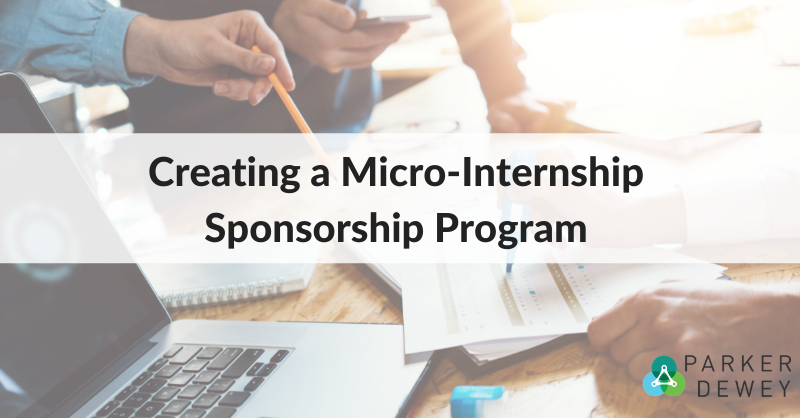
The Ultimate Win-Win-Win: Creating a Micro-Internship Sponsorship Program
Employer sponsorships have historically been a wonderful way for colleges/universities to receive much-needed revenue and employers to increase their brand on campus, a great win-win for both.
But what if these programs could directly benefit employers, schools/organizations, AND students? After hearing insights from dozens of higher ed and college recruiting professionals, Parker Dewey recently hosted a webinar that summarizes multiple ideas for how a Micro-Internship Sponsorship Program can help attract new employers and strengthen relationships with current sponsors all while providing paid professional experiences to students.
You can watch the full replay here, view the slides (PDF), or read on for our summary.
Overview of a Micro-Internship Sponsorship Program
Even before COVID, employers have been scouting for ways to access talent early on, build their brand, enhance diversity, and be better at determining the right-fit-candidates for their organization. Yet, we see evidence that the traditional models aren’t working for them. Statistics show 55% attrition rates for new hires while 41% of recent college grads are under-employed. And now with the added inability to engage them through onsite programs and events, things have become even harder.
We’ve spent a lot of time over the past 5+ years talking to and getting to understand thousands of employers’ goals around recruiting. Their main areas of concern are 1) understanding how to stand out to cut through the noise and 2) how to build the relationship once the student is engaged.
The solution? Micro-Internships. These are short-term, paid, professional, and remote experiences that college students work on, on behalf of companies. They’re used in all industries, across all areas of an organization, and can take place year-round.
We’d like to note that Micro-Internships are not a reaction to COVID-19. They are part of a strategy that has been proven effective over the past 5 years. We’ve observed that >95% of Micro-Internships have been successfully completed and >70% of them have been for companies that provided multiple projects.
A Micro-Internship Sponsorship program combines these benefits to employers while also augmenting your sponsorship packages to directly support your students and financially support your university.
Four options to implement programs
Here are four specific ways you can implement Micro-Internship sponsorship packages with employers:
1. Revenue split
With this option, one portion of your package value goes towards financing Micro-Internships for your students while the other goes toward your office. You can allocate it however you’d like; whether it’s a 50-50 split, 75%-25%, or 100% full support to your students, it is completely up to you.
For example, a $5,000 sponsorship:
- 5 Micro-Internships for your students at the sponsoring company
- $2,500 to your office
Keep in mind that the value proposition to the companies is that they get access to talent early and also have the opportunity to build their brand on your campus, enhance their diversity initiatives, and engage with hiring managers. Micro-Internships also lower the cost per hire to a 40-80% decrease compared to traditional methods. A program like this can also be implemented at any time since Micro-Internships provide just-in-time support to organizations all throughout the year.
2. Add on
This option acts as a supplemental add-on to your typical sponsorship packages. Like in the previous option, one portion would go toward financing Micro-Internships for your students, the other toward your office, and you can decide how you want to price and structure this package.
For example, if your typical package is $3,000 and contains:
- Premium location at onsite and/or virtual events
- Student interaction via info session(s), guest speaker presentations, etc.
- Branding in office and marketing materials
For $4,000, the company could receive all of that PLUS:
- At least 2 Micro-Internships for your students at the sponsoring company
- Branding on student-focused Micro-Internship page (like this)
This option is flexible and can be scaled to your school/organization or the companies’ specific needs.
3. Corporate giving
Over the past several months, we’ve seen companies providing corporate giving to higher education institutions to support Micro-Internship programs. The company's foundation provides the funding, non-profits or small businesses provide the project, and the work is done by your students. This unique program allows these organizations a chance to give back to their community and local nonprofits/businesses while also directly supporting your students and school/organization. Look no further than Cincinnati or Kansas to see how these partnerships can directly benefit a local community.
For example, a $7,500 sponsorship:
- 15 Micro-Internships for your students*
- Philanthropic Support: Directly benefits both the small organizations/non-profits and your university
- Branding: Featured on your student-facing page
4. Speed interview event
This is a virtual hour-long event that engages employers across an organization with multiple students from your university in quick 5-10 minute conversations. At the end of these events, employers can determine which student(s) from the group would be a good fit for a Micro-Internship opportunity. Speed Interview events can be hosted at any time, scaled based on the company’s needs, and can be priced in a variety of ways to include an option for revenue generation for your institution.
Our team at Parker Dewey will manage the entire backend and provide the platform where alumni and employers can conduct these interviews. All you need to do is engage the companies who would like to participate then spread the word to your students.
Suggested cost of event: $2,500 per company
- $1,000 to students selected for 20-25 hour Micro-Internships
- $1,000 to your office
- $500 to Parker Dewey for event administration (includes hosting the event and the 10% Micro- Internship admin)
*Note: Parker Dewey retains 10% of the funds allocated to Micro-Internships to cover the accounting, financial, and legal expenses associated with the program. There are no additional fees, so it's up to you to decide how you would like to allocate sponsored funds.
What are the benefits for employers?
Not only are companies getting work done through Micro-Internships, but they are also providing an entryway into their organization, which students may not have known about otherwise, along with opportunities for real-world, hands-on experiences. Recruiters can reach diverse student communities from any background and geographic location, which gives employers the chance to build authentic relationships as the students get to understand their brand and vice-versa.
Plus, there is no administrative burden for using Micro-Internships and there is no cost to hire for a longer-term position. This is all done through one easy platform that engages all students—undergrad or grad—across all majors.
What are the benefits for universities?
Revenue generation
These are challenging times for higher education institutions nationwide, and many career services offices are experiencing decreased revenue from events or lower budget allocations from their institutions. This program is a new way to generate revenue and an easy "ask" of sponsoring companies since they experience an immediate ROI.
Flexibility
One of the key benefits of these sponsorship program ideas is the flexibility. This way, you can customize the program to fit the needs of your current sponsorship strategy and the employers that you may wish to engage. The program can also be offered at various strategic points throughout the year such as the start of the academic year, during a virtual homecoming or other similar events, or at the beginning of a new term.
All sponsorships directly support students
Each package contains at least one Micro-Internship for your students. This program can be scaled to whatever size you wish so that multiple students across campus can benefit. Additionally, these projects can be conducted remotely or onsite depending on the needs of the company.
No cost to university to implement
Our team at Parker Dewey will be able to help you with the program implementation and marketing collateral, give you access to relevant data, and provide programmatic support throughout the entire length of the Micro-Internship. Our revenue comes from 10% of the total cost of the sponsorship package that’s tied to Micro-Internships, so the portion that you allocate towards supporting your university is entirely yours.
Suggested strategies for implementation
To start, we suggest thinking about what is already going on with your university. The flexibility built into Micro-Internship Sponsorships makes it easy to add them on as a part of your general sponsorship programs and packages or as an ad hoc. You can also run an event like “Option 4” at any time throughout the year.
No matter how you’d like to implement a program like this, the time to start is now. Companies are looking for unique strategies to connect with your students remotely. They want to find the right talent, and experiential recruiting through Micro-Internships is a proven, effective method to build authentic relationships with your students, build their brand, and reach your diverse student communities.
Micro-Internship employer sponsorships allow companies to connect to your best students in a remote, equitable way while directly supporting your institution. This creates a true win-win-win for your students, the company sponsors, and your university.
For help with developing a Micro-Internship Sponsorship program, click here to access our toolkit or contact us for more information.


-1.png)
-1.png)
